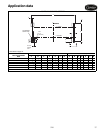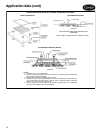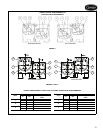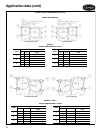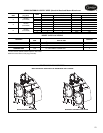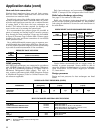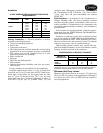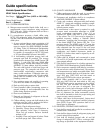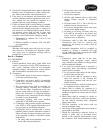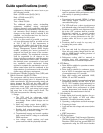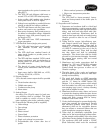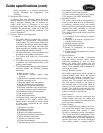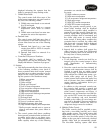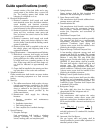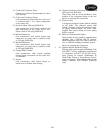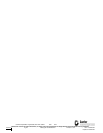
29
displayed informing the operator that the
chiller is operating in ramp loading mode.
l. Chilled Water Reset:
The control center shall allow reset of the
chilled water temperature set point based on
any one of the following criteria:
1) Chilled water reset based on an external
4 to 20 mA signal.
2) Chilled water reset based on a remote
temperature sensor (such as outdoor
air).
3) Chilled water reset based on water tem-
perature rise across the evaporator.
m. Demand Limit:
The control center shall limit amp draw of
the compressor to the rated load amps or to
a lower value based on one of the following
criteria:
1) Demand limit based on a user input
ranging from 40% to 100% of compres-
sor rated load amps
2) Demand limit based on external 4 to
20 mA signal.
n. Controlled Compressor Shutdown:
The controls shall be capable of being
configured to soft stop the compressor. The
display shall indicate “shutdown in progress.”
2. Safeties:
a. Unit shall automatically shut down when any
of the following conditions occur (each of
these protective limits shall require manual
reset and cause an alarm message to be dis-
played on the control panel screen, inform-
ing the operator of the shutdown cause):
1) Motor overcurrent
2) Over voltage*
3) Under voltage*
4) Single cycle dropout*
5) Low oil sump temperature
6) Low evaporator refrigerant temperature
7) High condenser pressure
8) High motor temperature
9) High compressor discharge temperature
10) Low oil pressure
11) Prolonged stall
12) Loss of cooler water flow
13) Loss of condenser water flow
14) Variable frequency drive fault
15) High variable frequency drive temperature
* Shall not require manual reset or cause an
alarm if auto-restart after power failure is
enabled.
b. The control system shall detect conditions
that approach protective limits and take self-
corrective action prior to an alarm occur-
ring. The system shall automatically reduce
chiller capacity when any of the following
parameters are outside their normal operat-
ing range:
1) High condenser pressure
2) High motor temperature
3) Low evaporator refrigerant temperature
4) High motor amps
5) High VFD rectifier temperature
6) High VFD inverter temperature
c. During the capacity override period, a pre-
alarm (alert) message shall be displayed
informing the operator which condition is
causing the capacity override. Once the con-
dition is again within acceptable limits, the
override condition shall be terminated and
the chiller shall revert to normal chilled
water control. If during either condition the
protective limit is reached, the chiller shall
shut down and a message shall be displayed
informing the operator which condition
caused the shutdown and alarm.
d. Internal built in safeties shall protect the
chiller from loss of water flow. Differential
pressure switches shall not be allowed to be
the only form of freeze protection.
3. Diagnostics and Service:
a. A self diagnostic controls test shall be an
integral part of the control system to allow
quick identification of malfunctioning
components.
b. Once the controls test has been initiated, all
pressure and temperature sensors shall be
checked to ensure they are within normal
operating range. A pump test shall automat-
ically energize the chilled water pump, con-
denser water pump, and oil pump. The
control system shall confirm that water flow
and oil pressure have been established and
require operator confirmation before pro-
ceeding to the next test.
c. In addition to the automated controls test,
the controls shall provide a manual test
which permits selection and testing of indi-
vidual control components and inputs. A
thermistor test and transducer test shall dis-
play on the ICVC screen the actual reading
of each transducer and each thermistor
installed on the chiller. All out-of-range sen-
sors shall be identified. Pressure transducers
shall be serviceable without the need for
refrigerant charge removal or isolation.
4. Multiple Chiller Control:
The chiller controls shall be supplied as stan-
dard with a two-chiller lead/lag and a third
chiller standby system. The control system shall
automatically start and stop a lag or second
chiller on a two-chiller system. If one of the two
chillers on line goes into a fault mode, the third
standby chiller shall be automatically started.
The two-chiller lead/lag system shall allow



